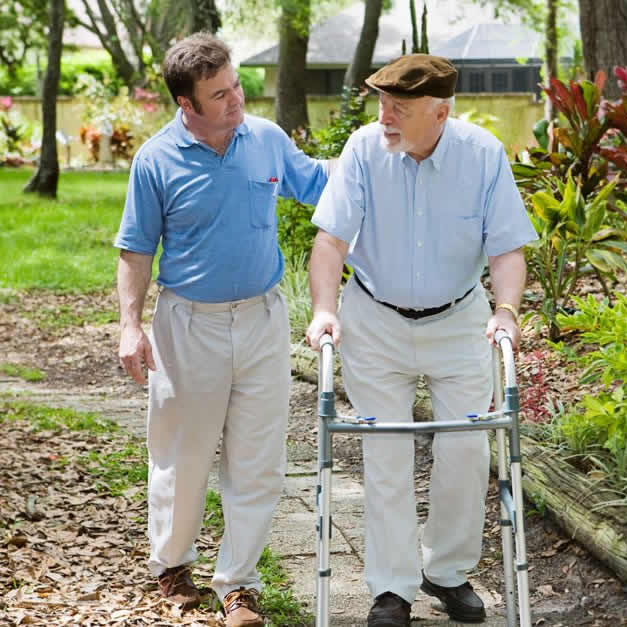In the summer months it might be easier to stay in and relax when you are caring for a person with dementia. And, while relaxing is great and taking time to unwind is encouraged, especially for caregivers, it is also important to have new experiences.

New experiences, even small outings or new activities can provide great mental stimulation for you and your loved one with dementia. So, take advantage of the beautiful weather and explore the possibilities available right outside your door.
Tips for the Summer Heat
The Alzheimer’s Foundation of America says “The dangers of extreme temperatures, which can cause heat stroke in a matter of minutes, are magnified for someone living with dementia. Dementia-related illnesses can impair a person’s ability to know when they are thirsty or in danger of overheating.”
This means it is crucial to be aware of temperatures and how to take preventative measures on behalf of your person living with dementia.

- Hydration: Dementia-related illnesses can affect one’s ability to understand or convey thirst cues; therefore, having a schedule for drinking water can be helpful. Avoid alcoholic and caffeinated beverages which contribute dehydration. You can also incorporate beverages fortified with electrolytes as a way to retain hydration.
- Keep an Open Eye: Hyperthermia occurs when the body increases temperature due to an inability to regulate heat from the environment. A person with dementia is more likely to go into hyperthermia. Look out for warning signs to alleviate this worry. Checking for excessive sweating, flushed complexions, fast or extremely slow pulse, and body heat, can help you take the necessary measures to avoid overheating. It is beneficial to carry a cloth to soak in water to cool off, use an umbrella, and know where to go to cool down.
Indoor Summer Fun to Beat the Heat
The Alzheimer’s Association says that participating in daily activities can help a person with dementia by “providing a sense of dignity and accomplishment,” among other benefits. There are many indoor activities that can be beneficial and catered to you and your loved one, as well as the person’s current disease stage.
Indoor Summer Activities:

- Arts and Crafts- Painting, coloring, and working with one’s hands in a creative way allows a person with dementia to better self-express.
- Knitting- An ongoing project like knitting a blanket can provide structure and lower anxiety.
- Look at Photo Albums- Looking to the past can create better familial bonds and help a person with dementia gain some personal identity.
- Cook- Giving a person with dementia small tasks in a rewarding project, like making a meal is a way to provide independence. Try cooking old family recipes.
- Listen or Play Music- Music has been proven to help with behavioral and mental health issues while increasing engagement.
- Puzzles and Games- Simple activities like puzzles provide great mental stimulation.
- Yoga and Other Low-Impact Exercises- Easy body movements help with mood, sleep, cognitive function, and more.
- Join a Local Book Club- Small group activities allow for social interaction and something to look forward to each week.
Enjoying Summer in the Outdoors
Getting outside and in the sun has shown to improve mood, mental health, and help in lowering blood pressure. Being outside also encourages physical movement. Participating in activities outside of the house can bring a “sense of normality” to those with dementia according to the Alzheimer’s Association.
Outdoor Summer Activities:

- Gardening- Studies have found that gardening has therapeutic benefits and can reduce agitation.
- Walking- Incorporate small time periods of walking throughout the day to get out of the house.
- Feeding Birds- Animal interaction has shown to help with mood. Make sure to follow animal safety and wildlife rules.
- Play Catch- Small interactive and physical games help with coordination.
- Have a Picnic- It can be as simple as eating your regular lunch in the backyard or on the porch.
- Take a Trip Down Memory Lane- Visit locations that hold a special place for your loved one, old summer hangouts, places from childhood, etc. Keep a notepad handy to jot down any memories your loved one might share.
These examples are just starting off points. Hopefully you can find a few that spark your interest and cater them to your personal preferences. Find what works best for you, your loved one with dementia, and your life. Remember that caregiving is hard work. Try not to be hard on yourself about creating an activity-heavy, fun-packed summer. Do what works best for you. Adding daily activity can be as simple as sitting outside each evening to talk about your day or making a pitcher of lemonade together. Small activities are a big win for you and your loved one.








